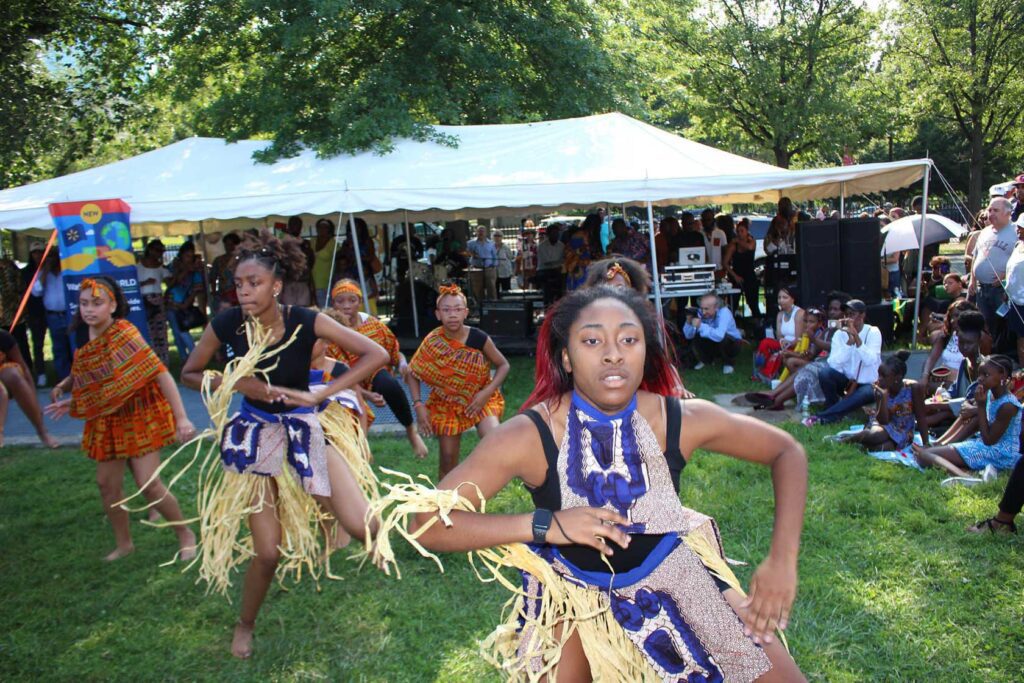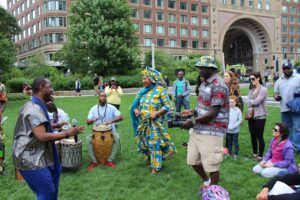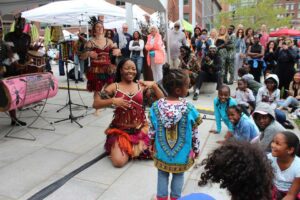
Back in 2010, Mireille Tushiminina and her mom wanted to find a way to bring awareness to Boston’s African population and connect Africans in the city with one another.
Coincidentally, that year, 17 sub-Saharan African countries were celebrating independence from colonial rule, among them Senegal and Cameroon in the West, Madagascar off the east coast, and, Tushiminina’s home country in the heart of the continent, the Democratic Republic of Congo.
The women seized the momentum of the moment, founding the African Festival of Boston to spotlight the many cultures of Africa and remind people that it was in fact a continent, not a country, made up of over 50 nations.
“We wanted to create a platform where African immigrants will have access to services, access to other community, build a community, but more importantly share our culture,” Tushiminina said. “We’re here. Boston is home.”
Initially, Tushiminina wasn’t sure how people would react to the festival and worried that they might not be open to learning about African cultures. But the inaugural event was well attended, and the positive feedback the organizers received encouraged them to continue.
Now an annual event in its 14th year, the African Festival of Boston brings a taste of the continent’s music, food and craftsmanship to New England, attracting thousands of attendees each year, according to Tushiminina, with a peak of 5,000 people before the pandemic.
This year, the festival will take over the Boston Common from Aug. 17-18 for a celebration of African heritage with performances by artists from Uganda, Mozambique, Mali and more.
The festival has grown since 2010 with new offerings added to the agenda. Last year, seeking to incorporate more educational elements, Tushiminina introduced the children’s cultural heritage area, where three local African authors from Cape Verde, Botswana and Ghana shared their work and their experiences as immigrants and transplants in the diaspora. This year, American-Ghanaian writer Nana Ekua Brew-Hammond will make an appearance.
Although there have been challenges each year in the festival planning, the organizers have continued to invest in bringing “a new narrative about … the beauty of the continent and, more importantly, what Africans in the diaspora are doing in Boston,” Tushiminina said.
Africans in Boston are “a strong force,” especially in an election year, she said, adding that they don’t just want a seat at the table, they want to be treated as subject matter experts whose voices are taken seriously.
Tushiminina said she sees the festival, the flagship event of the Shalupe Community Alliance, an organization serving African immigrants founded in 2000, as a way to support the many African immigrants in Boston who are business owners and who contribute to the local economy.
The African Festival of Boston has built a loyal fan base of not just visitors but also vendors. Many of the people who set up stalls there have been doing so for years, with some having attended for over a decade, Tushiminina said. The festival has made enough of a name for itself that the organizers don’t have to do much outreach to connect with interested vendors.
Jacqueline Johnson Moore has been with the festival since the very beginning. Born in Liberia, Johnson Moore moved to Boston more than two decades ago and is the president of the Liberian Women’s Association of Massachusetts, an organization that serves women and children in Liberia.
Her organization usually supplies food at the festival, including traditional Liberian dishes of cassava leaves, rice bread, ginger beer, and the “best jollof rice,” according to Johnson Moore.
“There’s nothing like the motherland’s cooking,” she said.
This year, Johnson Moore’s booth will also have a display of Liberian clothing.
For her, the festival is an opportunity to meet new people and share stories, crucial to building a community in Boston.
“We are in another continent,” she said. “We are far away from home, and it’s very important for us uniting, coming together to showcase our culture, our dances and stuff that we bring from home, our art. … This is part of our connection. This is how we connect.”
Although she’s from West Africa, Johnson Moore spent a lot of time in East Africa in the past. Whenever she meets people from Kenya or Tanzania, she said it brings back memories from her time in the region — the food, the culture, the language.
Like Johnson Moore, Malagasy musician Niu Raza lived in various sub-Saharan African countries. Apart from her native Madagascar, she grew up in South Africa, Kenya and Uganda. When she moved to Boston to attend Berklee College of Music, she tried to “find a pocket of people” that embodied the familiarity she missed.
When the African Festival of Boston reached out to her in her early days in New England, she found that “sense of home … and sense of belonging,” that she hadn’t experienced since moving, she said.
“So that was my very first encounter with … a community of Africans when I moved. … So it was like, ‘Oh, there’s so many of us from everywhere.’ And that was kind of great for me,” she said.
Raza played the festival in 2015, in her first or second year of college, and will be back this year for the second time, giving audiences a sampling of her many homes through her music. In her artistry, Raza said she purposefully integrates musical elements from each of the places she lived but still grapples with her multiple identities.
“I wanted to embrace all the layers … that make me African, because I grew up in mostly African communities, and each and every bit of these cultures made me who I am today,” she said. “So I wanted to … reclaim all the parts of me that make me African.”
She also invites her audience to take part in that culture. Some of her performances become a sort of “Malagasy 101,” where she teaches concert-goers words in her mother tongue or traditional dances.
Her advice for attendees of the African Festival of Boston, she said, is to “come and be ready to dance because we’re gonna dance.”
“I think the African culture has space for everybody,” she said, “and I hope people can take a little bit of that sunshine that I love so dearly with them.”








